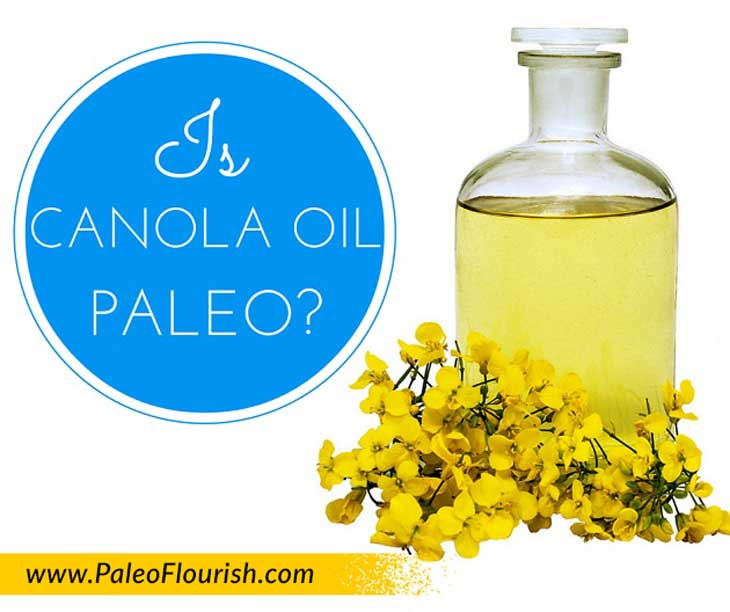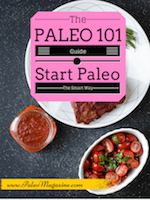Is Canola Oil Paleo?

If food were a game of hide and seek, canola oil would be just about the worst player ever.
Canola oil is absolutely everywhere you look. From mayonnaise to nuts to cooked vegetables – canola oil is in just about every food you can imagine. [We found this new mayo that uses avocado oil instead of canola oil – it’s sold here.]
Canola oil is a bit of a unique substance. We know that sunflower oil comes from sunflower seeds and olive oil from olives, so naturally, canola oil comes from canola seeds, right? As it turns out, there is no such thing as a canola seed. Canola oil is made from rapeseed (a very bright, yellow flower), and its name comes from a hybrid of the phrase “Canada oil.” It used to be called LEAR (Low Erucic Acid Rapeseed).
Is Canola Oil Healthy
Many mainstream scientists tout the benefits of canola oil for lowering the risk for heart disease. They often point to its 2:1 ratio of omega-6 to omega-3 fatty acids, which is a fairly good ratio.
However, that’s a bit misleading.
First of all, the omega-3 fats in canola oil aren’t the kind that our bodies use very well (remember, we need mostly the DHA and EPA forms of Omega-3 fats, neither of which are contained in canola oil).
In addition, canola oil is highly processed, since it’s pretty much impossible to press any oil out of a rapeseed. During processing, the seeds are heated and crushed before being bleached and deodorized.
Despite heavy genetic engineering (which may already make you leery), rapeseed is one of the most heavily pesticide-treated crops. In addition, the process of creating canola oil includes hydrogenation—the force required to create trans fats. These fats are not found in nature, and the body does not know how to process them. As a result, studies show that they throw our cholesterol off balance, pose risks to our cardiovascular health, contribute to insulin resistance, and cause an increase in all-cause mortality. In a nutshell, these studies are saying that if you consume trans fats like those found in hydrogenated canola oil, you’re more likely to die of, well, anything.
Why? Because the heavily modified molecules in canola oil inhibit the body’s natural ability to heal and take care of itself. It may also be worth bearing in mind that, in addition to food, canola oil is also often used in industrial lubricants, candles, and newspaper ink.
It seems like this hybrid oil is something Paleo followers should avoid, and Paleo experts agree.
What do other Paleo gurus say?
Mark Sisson says: “My thinking is this: why bother with something so processed and unhealthy when there are umpteen other, better options out there? Olive oil, coconut, palm oil, lard and ghee are suitable for most cooking applications. And for salads and other “no heat” dishes, you have dozens of tasty (non-deodorized) choices, including avocado and nut oils. As for canola, who needs it?”
Chris Kresser says: “Industrial seed oils…have not been a part of the human diet up until relatively recently, when misguided groups like the AHA and the ADA started promoting them as ‘heart-healthy’ alternatives to saturated fat. [They are] unnatural and unfit for human consumption.”
So is canola oil Paleo?
No.
While some Paleo experts say that you shouldn’t be completely doom-and-gloom if you eat a teaspoon of canola oil, who actually eats just a teaspoon?
There’s so much canola oil in so many foods that avoiding it altogether is by far the best option. Because it increases the mortality rate from all diseases and contributes to inflammation and illness, make sure to leave this one out next time you have a snack.
Images: Copyright (c) brhlena from Fotolia

